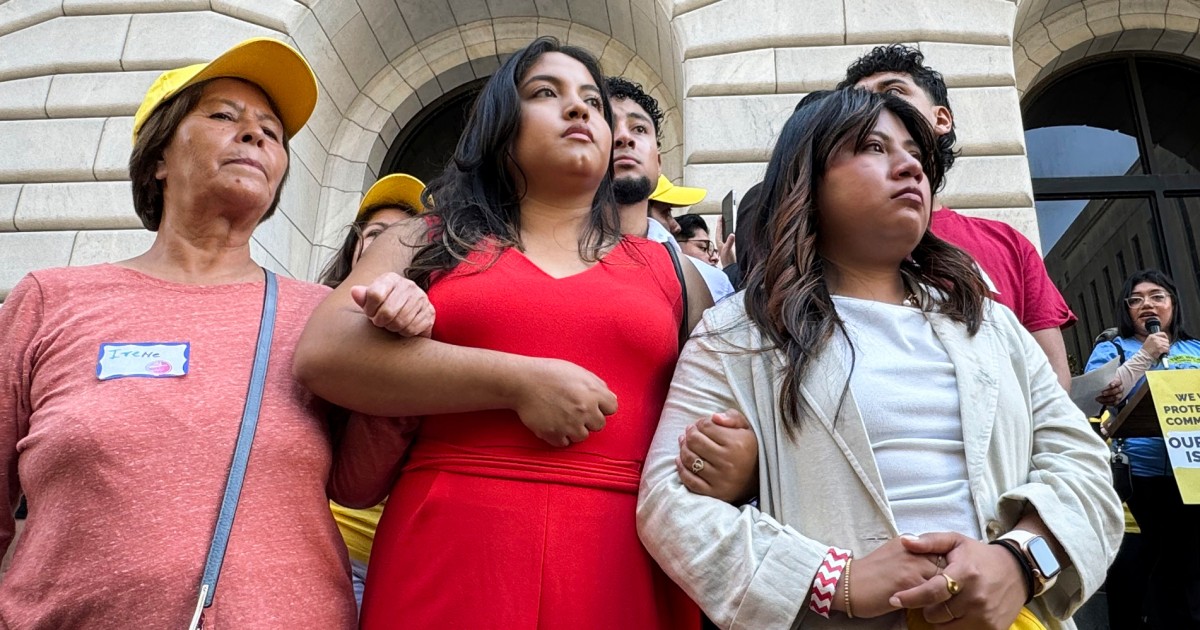Attorneys representing young immigrants protected by the Deferred Action for Childhood Arrivals program, better known as DACA, defended the legality of the program before an federal appellate court Thursday in an attempt to keep it alive — as its fate remains uncertain amid a six-year court battle.
At the 5th U.S. Circuit Court of Appeals in New Orleans, three appellate judges heard arguments over recent efforts by the Biden administration to turn DACA into a federal regulation, hoping to increase the program’s chances of surviving legal challenges in the future.
The Obama-era program was first challenged in 2018, when Texas and eight other Republican-led states sought to end the program after then-President Donald Trump’s efforts to terminate it failed. A Supreme Court ruling kept DACA in place.
Since it was put in place 12 years ago, DACA has allowed eligible young adults who came to the U.S. as children but lack legal immigration status to work and study without fear of deportation.
The Republican states have argued that they have suffered damages and injuries by spending millions of dollars on DACA recipients.
But Nina Perales, vice president of litigation at the Mexican American Legal Defense and Educational Fund and an attorney representing DACA recipients, said the states have actually not been able to prove this.
“Because of that, we argue that Texas lacks standing to sue and that the case should be dismissed,” Perales told reporters in a press call Thursday afternoon.
The appellate judges gave no indication of when or how they will rule. Perales has said they could rule in a few different ways. The court may dismiss the case, refer it back to the lower court or rule against DACA, which could then be appealed to the U.S. Supreme Court.
On Thursday, hundreds of demonstrators gathered outside the courthouse in support of the program.
María Rocha-Carrillo, 37, of New York, traveled to New Orleans to join the demonstration and attend the hearing. At 3, she was brought to the U.S. by family members who had emigrated from Mexico, where she was born. Having DACA allowed her to get a teaching certificate and build a career in education.
“I live here. I work here. I own a home here,” Rocha-Carrillo said.
Gaby Pacheco, the director of advocacy, development and communications at TheDream.Us, an organization helping young immigrants complete college, also attended the hearing.
“As we were asked to all rise, I looked to my left, I looked to my right, and I got to see all those people who once upon a time were children and today are adults and are young people with so much desire to continue to belong to their community, to the country that they have called home for a very long time,” Pacheco said.
The average DACA recipient is in his or her 30s and has lived in the U.S. for more than 16 years, according to United We Dream, the nation’s largest immigrant youth-led network. Nearly half of DACA recipients are married and 50% of them have a child.
Supporters have long said DACA is one of the most successful policies for immigrant integration.
“They are Americans in every way except on paper,” Pacheco said.
Though Trump wasn’t able to end DACA when he was president, lawsuits from Republican states have limited its expansion.
A federal judge in Texas has ruled that DACA is illegal multiple times over the years but has refrained from fully terminating it.
Under his most recent ruling last September, only current DACA recipients or those whose DACA statuses expired less than a year can continue to renew them every two years. But DACA remains closed to new applicants.
Read the full article here














